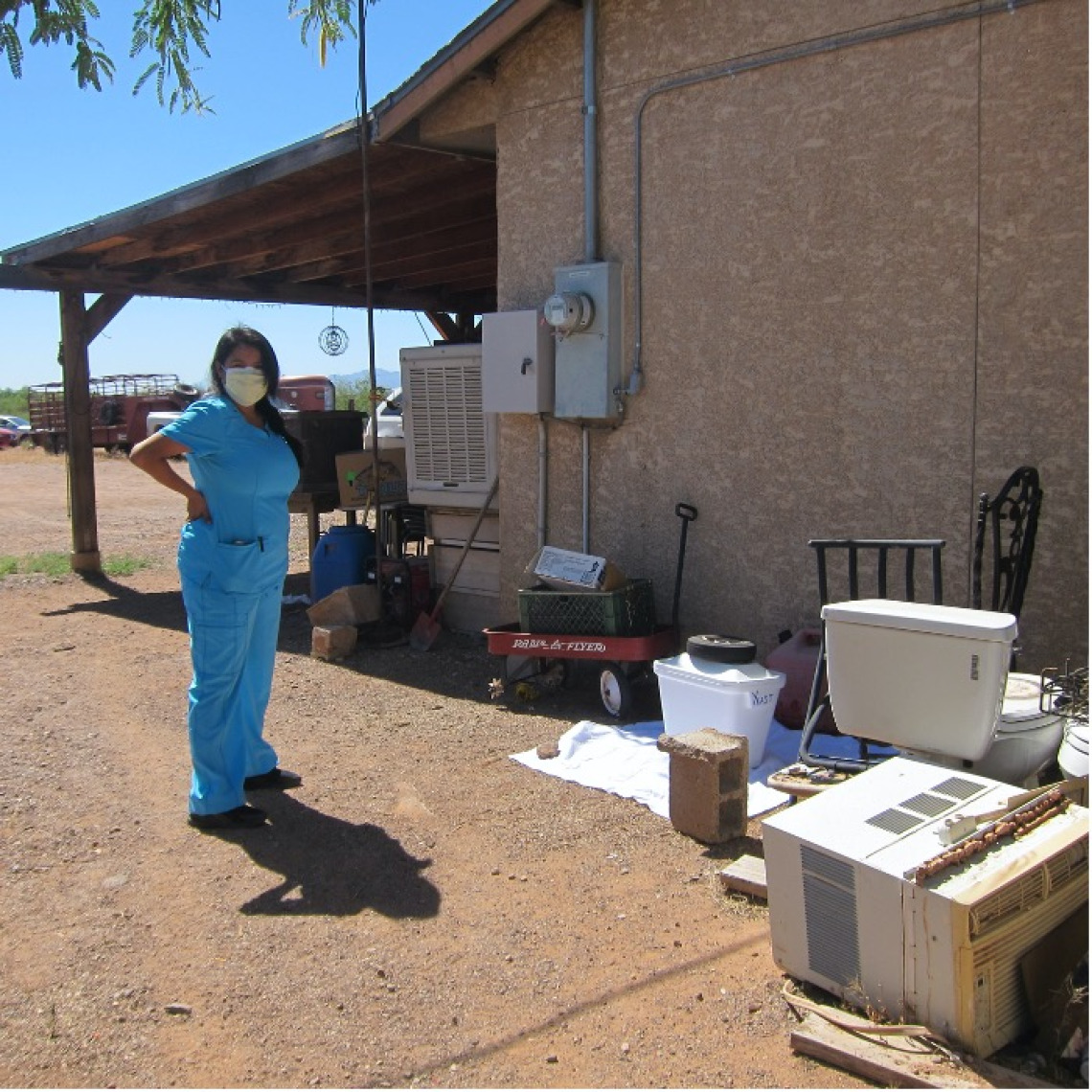A partnership between Tohono O’odham Nation DHHS and Vet Clinic and the UArizona Department of Entomology is strengthening community resilience, education, and voice in the context of climate change-induced spread of vector-borne disease.

The Tohono O'odham Nation Animal Welfare Coalition (TONAWC), formed in 2018, is an inter-agency group made up of experts from the TON Veterinary Clinic, TON Environmental Management, TON Department of Health and Human Services, and TON Animal Control, as well as outside members from Arizona Department of Health Services and the University of Arizona. One of the group's goals is to address health problems in domestic animals and to support inter-agency collaboration to prevent diseases that infect both humans and animals.
In 2019, through conversations with TON members and experts, the TON DHHS and the UArizona Department of Entomology partnered to develop the Community-based Tick-borne Disease Prevention Plan on The Tohono O'odham Nation project. In the same year, the Haury Program awarded a seed grant to UArizona Department of Entomology faculty Kathleen Walker, TON DHHS experts Carlos Aceves and Damascus Francisco, and TON Vet Clinic veterinary Antonia Pablo (Angie), to develop the project.
"I joined (the project) because I saw a need for it and wanted to help my community and their pets. I am a veterinarian, and love animals, particularly dogs. What I like about the project is that it provides medical services to people's pets, one of the three programs in the nation. I have learned much more about the biology and behavior of ticks during this project than in all my years as a veterinarian. One of the most important things for me has been disseminating tick-borne disease prevention measures among the population." – Antonia Angelina Pablo (Angie), TON Vet Clinic veterinary
The project aims to fill the gaps in community knowledge, attitudes, and practices regarding ticks. Ticks' range expansion has increased since 2002, leading to the emergence of Rocky Mountain spotted fever (RMSF) as a serious health problem among tribes and marginalized rural communities in Arizona and northwestern Mexico. The project also aims to identify ecological and social factors associated with the high abundance of the brown dog tick, use the data to predict future population densities, and design information campaigns to increase community awareness of RMSF risk.
The project, currently in its final phase, has:
- Developed a Knowledge, Attitudes, and Practices (KAP) survey to better understand what community members know about ticks and RMSF.
- Conducted annual assessments of tick infestations on dogs.
- Collected data on tick distribution to understand tick behavior.
- Developed a community education plan and tick surveillance plan.
As of December 2021, the KAP survey has been completed. Also, monthly environmental (off-dog) tick trappings were conducted in 2020 and 2021. Data was organized and analyzed by UArizona grad student Maureen Brophy and used to improve the existing community information materials and inform legislation development. The annual assessments of tick infestations on dogs took place during mobile rabies vaccination clinics in which inter-agency teams visited every TON village. In addition, a mobile dog spay/neuter clinic provided these services in each of the 11 districts of the Nation. Due to the reduction in available staff due to COVID, the TON Community Health Services Department partnered with TON Vet Clinic to provide CHRs (Community Health Representatives) teams to support the mobile clinics. As of December 2021, more than 3000 animals (and their humans!) have been protected from rabies and RMSF.
The project's results have helped increase community awareness of animal health resources and spay/neuter services. The project has also strengthened collaborations with TON agencies and UArizona (and all of this during a global pandemic!). The next steps include analyzing the KAP survey data, reporting program findings to TON agencies, sharing best practices with other tribes, and expanding the annual mobile rabies/tick surveillance to address dog wellness in general. The TON Executive Council is supporting investments in additional veterinary clinic personnel, essential for sustaining this One Health disease prevention program into the future.
“Over the past 18 months, I have spent many hours driving across the Tohono O’odham Nation learning about animal health as well as geography, ecology, and politics from health professionals of TON. In the process, I have learned to reframe the research questions to focus on finding the information that is truly useful to the community. During the COVID pandemic, when so many institutions have not been functioning normally, the resilience of the TON has been incredible. Through the collaboration of different TON agencies, the tick project has succeeded in protecting well over 1000 dogs and the people they live with. Every dog vaccinated and protected from ticks is a victory. I hope to continue the partnership with Angie Pablo of the TON Vet Clinic far into the future. Her energy and vision for a healthier community for both people and their dogs inspires me and gives a clear direction for my research.” – Kathleen Walker, UArizona Department of Entomology
